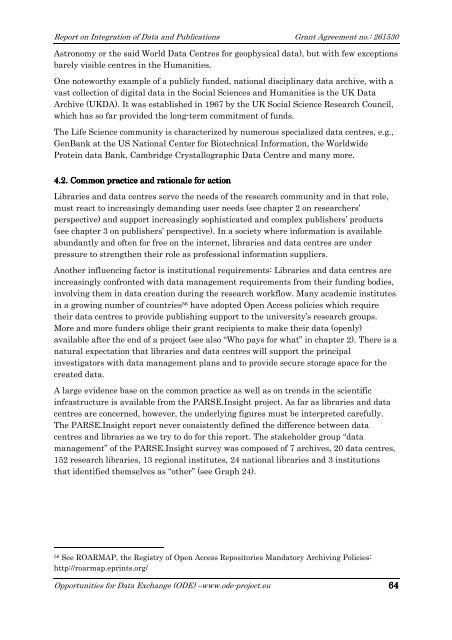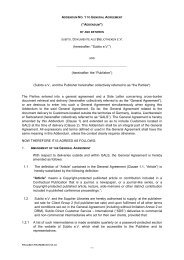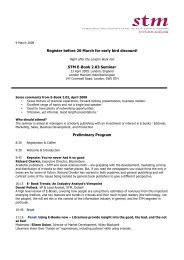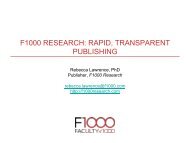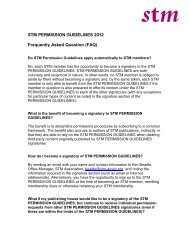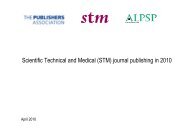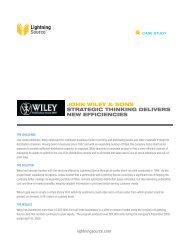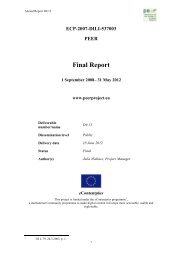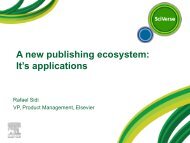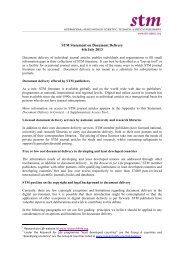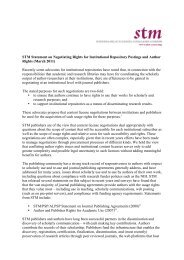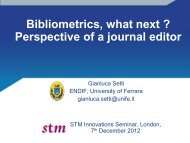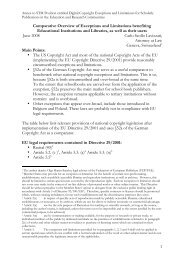Integration of Data and Publications - Alliance for Permanent Access
Integration of Data and Publications - Alliance for Permanent Access
Integration of Data and Publications - Alliance for Permanent Access
Create successful ePaper yourself
Turn your PDF publications into a flip-book with our unique Google optimized e-Paper software.
Report on <strong>Integration</strong> <strong>of</strong> <strong>Data</strong> <strong>and</strong> <strong>Publications</strong> Grant Agreement no.: 261530<br />
Astronomy or the said World <strong>Data</strong> Centres <strong>for</strong> geophysical data), but with few exceptions<br />
barely visible centres in the Humanities.<br />
One noteworthy example <strong>of</strong> a publicly funded, national disciplinary data archive, with a<br />
vast collection <strong>of</strong> digital data in the Social Sciences <strong>and</strong> Humanities is the UK <strong>Data</strong><br />
Archive (UKDA). It was established in 1967 by the UK Social Science Research Council,<br />
which has so far provided the long-term commitment <strong>of</strong> funds.<br />
The Life Science community is characterized by numerous specialized data centres, e.g.,<br />
GenBank at the US National Center <strong>for</strong> Biotechnical In<strong>for</strong>mation, the Worldwide<br />
Protein data Bank, Cambridge Crystallographic <strong>Data</strong> Centre <strong>and</strong> many more.<br />
4.2. Common practice <strong>and</strong> rationale <strong>for</strong> action<br />
Libraries <strong>and</strong> data centres serve the needs <strong>of</strong> the research community <strong>and</strong> in that role,<br />
must react to increasingly dem<strong>and</strong>ing user needs (see chapter 2 on researchers’<br />
perspective) <strong>and</strong> support increasingly sophisticated <strong>and</strong> complex publishers’ products<br />
(see chapter 3 on publishers’ perspective). In a society where in<strong>for</strong>mation is available<br />
abundantly <strong>and</strong> <strong>of</strong>ten <strong>for</strong> free on the internet, libraries <strong>and</strong> data centres are under<br />
pressure to strengthen their role as pr<strong>of</strong>essional in<strong>for</strong>mation suppliers.<br />
Another influencing factor is institutional requirements: Libraries <strong>and</strong> data centres are<br />
increasingly confronted with data management requirements from their funding bodies,<br />
involving them in data creation during the research workflow. Many academic institutes<br />
in a growing number <strong>of</strong> countries 56 have adopted Open <strong>Access</strong> policies which require<br />
their data centres to provide publishing support to the university’s research groups.<br />
More <strong>and</strong> more funders oblige their grant recipients to make their data (openly)<br />
available after the end <strong>of</strong> a project (see also “Who pays <strong>for</strong> what” in chapter 2). There is a<br />
natural expectation that libraries <strong>and</strong> data centres will support the principal<br />
investigators with data management plans <strong>and</strong> to provide secure storage space <strong>for</strong> the<br />
created data.<br />
A large evidence base on the common practice as well as on trends in the scientific<br />
infrastructure is available from the PARSE.Insight project. As far as libraries <strong>and</strong> data<br />
centres are concerned, however, the underlying figures must be interpreted carefully.<br />
The PARSE.Insight report never consistently defined the difference between data<br />
centres <strong>and</strong> libraries as we try to do <strong>for</strong> this report. The stakeholder group “data<br />
management” <strong>of</strong> the PARSE.Insight survey was composed <strong>of</strong> 7 archives, 20 data centres,<br />
152 research libraries, 13 regional institutes, 24 national libraries <strong>and</strong> 3 institutions<br />
that identified themselves as “other” (see Graph 24).<br />
56 See ROARMAP, the Registry <strong>of</strong> Open <strong>Access</strong> Repositories M<strong>and</strong>atory Archiving Policies:<br />
http://roarmap.eprints.org/<br />
Opportunities <strong>for</strong> <strong>Data</strong> Exchange (ODE) –www.ode-project.eu 64


